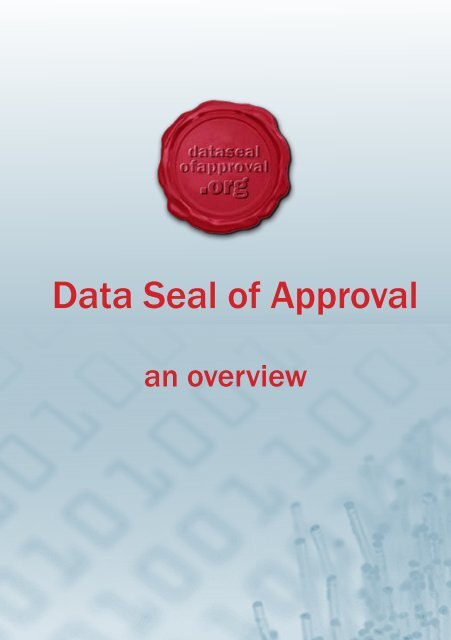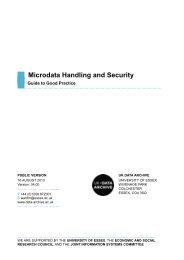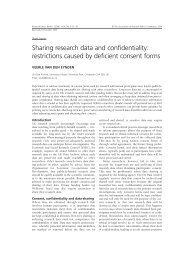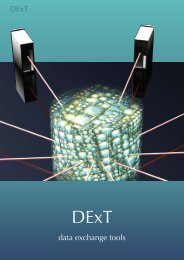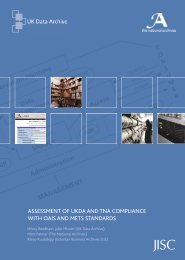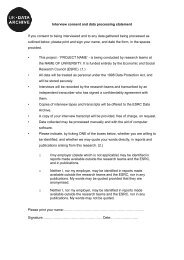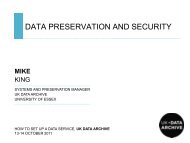Data Seal of Approval - an overview - UK Data Archive
Data Seal of Approval - an overview - UK Data Archive
Data Seal of Approval - an overview - UK Data Archive
You also want an ePaper? Increase the reach of your titles
YUMPU automatically turns print PDFs into web optimized ePapers that Google loves.
<strong>Data</strong> <strong>Seal</strong> <strong>of</strong> <strong>Approval</strong><br />
<strong>an</strong> <strong>overview</strong>
The <strong>Data</strong> <strong>Seal</strong> <strong>of</strong> <strong>Approval</strong> (DSA)<br />
The <strong>Data</strong> <strong>Seal</strong> <strong>of</strong> <strong>Approval</strong> was established by a number <strong>of</strong> institutions committed<br />
to the long-term archiving <strong>of</strong> research data. By assigning the seal, the DSA group<br />
seeks to guar<strong>an</strong>tee the durability <strong>of</strong> the data concerned, but also to promote the<br />
goal <strong>of</strong> durable archiving in general.<br />
The <strong>Data</strong> <strong>Seal</strong> <strong>of</strong> <strong>Approval</strong> is gr<strong>an</strong>ted to repositories that are committed to archiving<br />
<strong>an</strong>d providing access to scholarly research data in a sustainable way. It is<br />
assigned by the DSA Board <strong>an</strong>d renewed every year through a modification procedure.<br />
The Board consists <strong>of</strong> members from the following institutes: Alfred Wegener Institute<br />
(Germ<strong>an</strong>y), CINES (Fr<strong>an</strong>ce), DANS (The Netherl<strong>an</strong>ds), ICPSR (USA), MPI for<br />
Psycholinguistics (The Netherl<strong>an</strong>ds), NESTOR (Germ<strong>an</strong>y) <strong>an</strong>d <strong>UK</strong> <strong>Data</strong> <strong>Archive</strong><br />
(United Kingdom).<br />
Institutions that have achieved the <strong>Data</strong> <strong>Seal</strong> <strong>of</strong> <strong>Approval</strong> have the right to display<br />
the DSA logo on their Web sites, thereby demonstrating the reliability <strong>of</strong> their archival<br />
processes <strong>an</strong>d procedures, without this entailing new thresholds, regulations<br />
or high costs.<br />
The DSA Assessment<br />
Achieving the DSA me<strong>an</strong>s that the data archive or repository is in compli<strong>an</strong>ce with<br />
the sixteen DSA guidelines, as determined through <strong>an</strong> assessment procedure.<br />
Although these guidelines pertain to three stakeholders – the data producer (three<br />
guidelines), the data consumer (three guidelines) <strong>an</strong>d the data archive (ten guidelines)<br />
– the data archive is seen as the primary implementer <strong>of</strong> the guidelines. The<br />
data archive as <strong>an</strong> org<strong>an</strong>ization should assume responsibility for the overall implementation<br />
<strong>of</strong> the DSA in its own specific field.<br />
DANS is <strong>an</strong> institute <strong>of</strong> KNAW <strong>an</strong>d NWO<br />
Max Pl<strong>an</strong>ck Institute<br />
for Psycholinguistics
Procedure<br />
To achieve the <strong>Data</strong> <strong>Seal</strong> <strong>of</strong> <strong>Approval</strong>, <strong>an</strong>d thereby receive permission to use the<br />
DSA logo, the repository must keep a file directory on the Web that is accessible<br />
through the front page <strong>of</strong> the repository. This assessment directory contains:<br />
1. An up-to-date version <strong>of</strong> the <strong>Data</strong> <strong>Seal</strong> <strong>of</strong> <strong>Approval</strong> h<strong>an</strong>dbook<br />
(data seal <strong>of</strong> approval.pdf)<br />
2. The information leaflet about the <strong>Data</strong> <strong>Seal</strong> <strong>of</strong> <strong>Approval</strong> Assessment<br />
(DSA leaflet.pdf)<br />
3. The <strong>Data</strong> <strong>Seal</strong> <strong>of</strong> <strong>Approval</strong> Assessment form ( DSA Assessment form.doc).<br />
All the above-mentioned documents c<strong>an</strong> be found on the DSA Web site:<br />
www.dataseal<strong>of</strong>approval.org<br />
The completion <strong>of</strong> the DSA self-assessment form is the starting point for the<br />
reviewing procedure. The assessment is then sent to the Board in order to decide<br />
via peer review whether <strong>an</strong> org<strong>an</strong>ization will be gr<strong>an</strong>ted the <strong>Seal</strong> <strong>of</strong> <strong>Approval</strong>. There<br />
is no audit, no certification: just a review on the basis <strong>of</strong> trust.<br />
The DSA Assessment form.doc consists <strong>of</strong> a guide to facilitate completion <strong>of</strong> the<br />
assessment, the assessment itself <strong>an</strong>d a modification record.<br />
• The assessment lists the sixteen <strong>Data</strong> <strong>Seal</strong> <strong>of</strong> <strong>Approval</strong> guidelines. In the assessment,<br />
the org<strong>an</strong>ization describes how these guidelines relate to the repository<br />
<strong>an</strong>d how they have been implemented. The assessment reflects the current<br />
situation <strong>of</strong> the repository in a tr<strong>an</strong>sparent <strong>an</strong>d open m<strong>an</strong>ner.<br />
• In the modification record, every modification made to the assessment is<br />
recorded. If information ch<strong>an</strong>ges, the org<strong>an</strong>ization informs the DSA Board by<br />
email info@dataseal<strong>of</strong>approval.org<br />
• When approval is gr<strong>an</strong>ted by the DSA Board, the DSA logo is displayed on the<br />
front page <strong>of</strong> the repository by me<strong>an</strong>s <strong>of</strong> HTML code, which the org<strong>an</strong>ization<br />
receives from the Board. It contains a link to www.dataseal<strong>of</strong>approval.org as<br />
well as a link to the org<strong>an</strong>ization’s repository assessment directory.<br />
The DSA Board places a link pointing to the repository on the Web site dataseal<strong>of</strong>approval.org,<br />
using the logo <strong>of</strong> the specific repository or the name <strong>of</strong> the repository<br />
in combination with the logo <strong>of</strong> the hosting org<strong>an</strong>ization.<br />
DSA Board<br />
http://www.dataseal<strong>of</strong>approval.org<br />
email: info@dataseal<strong>of</strong>approval.org
The <strong>Data</strong> <strong>Seal</strong> <strong>of</strong> <strong>Approval</strong> Guidelines<br />
1. The data producer deposits the research data in a data<br />
repository with sufficient information for others to assess<br />
the scientific <strong>an</strong>d scholarly quality <strong>of</strong> the research data<br />
<strong>an</strong>d compli<strong>an</strong>ce with disciplinary <strong>an</strong>d ethical norms.<br />
2. The data producer provides the research data in formats<br />
recommended by the data repository.<br />
3. The data producer provides the research data together<br />
with the metadata requested by the data repository.<br />
4. The data repository has <strong>an</strong> explicit mission in the area <strong>of</strong><br />
digital archiving <strong>an</strong>d promulgates it.<br />
5. The data repository uses due diligence to ensure compli<strong>an</strong>ce<br />
with legal regulations <strong>an</strong>d contracts.<br />
6. The data repository applies documented processes <strong>an</strong>d<br />
procedures for m<strong>an</strong>aging data storage.<br />
7. The data repository has a pl<strong>an</strong> for long-term preservation<br />
<strong>of</strong> its digital assets.<br />
8. Archiving takes place according to explicit workflows<br />
across the data life cycle.<br />
9. The data repository assumes responsibility from the data<br />
producers for access to <strong>an</strong>d availability <strong>of</strong> the digital<br />
objects.<br />
10. The data repository enables the users to utilize the research<br />
data <strong>an</strong>d refer to them.<br />
11. The data repository ensures the integrity <strong>of</strong> the digital<br />
objects <strong>an</strong>d the metadata.<br />
12. The data repository ensures the authenticity <strong>of</strong> the digital<br />
objects <strong>an</strong>d the metadata.<br />
13. The technical infrastructure explicitly supports the tasks<br />
<strong>an</strong>d functions described in internationally accepted archival<br />
st<strong>an</strong>dards like OAIS.<br />
14. The data consumer must comply with access regulations<br />
set by the data repository.<br />
15. The data consumer conforms to <strong>an</strong>d agrees with <strong>an</strong>y codes<br />
<strong>of</strong> conduct that are generally accepted in higher education<br />
<strong>an</strong>d research for the exch<strong>an</strong>ge <strong>an</strong>d proper use <strong>of</strong> knowledge<br />
<strong>an</strong>d information.<br />
16. The data consumer respects the applicable licences <strong>of</strong> the<br />
data repository regarding the use <strong>of</strong> the research data.


